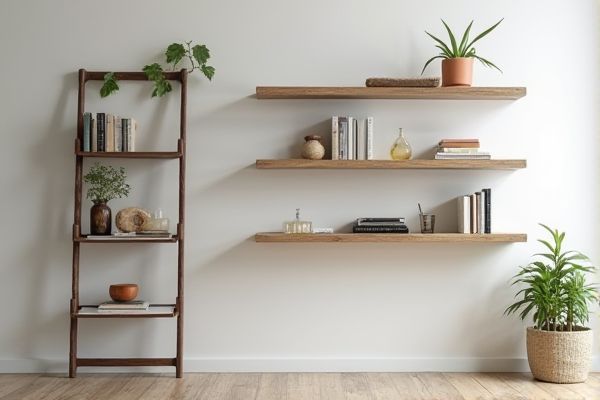
Wall mounted shelves save floor space and provide a sleek, modern look, ideal for small rooms or minimalist decor, while freestanding racks offer greater mobility and versatility for organizing items in various locations. Discover which storage solution best fits your needs by reading the rest of this article.
Table of Comparison
| Feature | Wall Mounted Shelf | Freestanding Rack |
|---|---|---|
| Installation | Requires wall mounting, screws, and anchors | No installation needed, just place on floor |
| Space Efficiency | Saves floor space, ideal for small rooms | Occupies floor space, needs more room |
| Weight Capacity | Depends on wall strength, usually moderate | Generally higher, supports heavy items |
| Mobility | Fixed, not movable once installed | Portable, easy to relocate |
| Design & Aesthetics | Streamlined look, custom heights | Bulkier appearance, multiple tiers available |
| Cost | Usually lower cost, minimal materials | Varies, often higher due to materials and size |
Introduction to Wall Mounted Shelves and Freestanding Racks
Wall mounted shelves save floor space by securely attaching to walls, offering a sleek and modern storage solution ideal for small rooms or narrow spaces. Freestanding racks provide versatile and portable storage options that can be easily rearranged to accommodate changing needs or larger items. Your choice between these depends on available space, weight capacity, and aesthetic preferences.
Space Efficiency: Wall Mounted vs Freestanding Storage
Wall mounted shelves maximize space efficiency by utilizing vertical wall areas, freeing up floor space for other uses, especially in small rooms or tight spaces. Freestanding racks offer flexible placement without installation but occupy substantial floor space, limiting room mobility. Choosing between the two depends on available floor area and need for adaptable storage configurations.
Installation Requirements and Complexity
Wall mounted shelves require secure anchoring into studs or solid walls, demanding precise measurements and tools for stability, making installation more complex than freestanding racks. Freestanding racks offer easy, tool-free setup and flexible placement without wall damage or structural concerns. Your choice depends on whether you prefer a permanent, space-saving solution or a portable, less installation-intensive option.
Design Versatility and Aesthetic Appeal
Wall mounted shelves offer sleek, space-saving designs that seamlessly integrate with modern interiors, enhancing room aesthetics without occupying floor area. Freestanding racks provide flexible placement options and diverse styles, allowing users to easily rearrange or move them to suit changing decor needs. Both options contribute distinct visual appeal, with wall shelves emphasizing minimalism and freestanding racks showcasing versatility and statement-making presence.
Weight Capacity and Durability Comparison
Wall mounted shelves typically offer higher weight capacity due to direct attachment to studs, supporting heavy items with less risk of tipping compared to freestanding racks. Freestanding racks rely on their frame strength and base stability, which may limit load capacity and durability under heavy or uneven weights. Durable materials like steel or hardwood optimize both options, but wall-mounted solutions generally provide superior long-term strength in weight-bearing applications.
Mobility and Adaptability in Different Spaces
Wall mounted shelves provide fixed storage that maximizes floor space, ideal for small rooms or permanent setups, but lack mobility and require professional installation. Freestanding racks offer superior adaptability and mobility, allowing you to easily relocate or reconfigure them in various spaces without tools. Your choice depends on whether you prioritize space-saving stability or flexible storage solutions that can evolve with changing needs.
Cost Analysis: Wall Mounted Shelf vs Freestanding Rack
Wall mounted shelves generally offer a more cost-effective solution compared to freestanding racks due to lower material usage and simpler installation requirements. Freestanding racks often incur higher expenses because of their bulkier design and the need for reinforced bases to ensure stability. Your budget considerations should weigh long-term durability and space efficiency, where wall mounted shelves typically provide better value for maximizing storage without occupying floor space.
Safety Considerations for Home and Office Use
Wall-mounted shelves offer enhanced safety by being securely anchored to walls, reducing the risk of tipping over in homes and offices with children or pets. Freestanding racks require careful placement and may need additional stabilization to prevent accidents, especially in high-traffic areas. You can improve safety by assessing load capacity and ensuring proper installation for either option in your space.
Maintenance and Cleaning Differences
Wall-mounted shelves require less frequent dusting due to their elevated position but can be harder to clean behind and underneath without removing the units. Freestanding racks allow easier access for thorough cleaning around all sides and underneath but tend to accumulate dust on all exposed surfaces more quickly. Maintenance for wall-mounted shelves may involve tightening wall anchors over time, while freestanding racks usually require checking stability and tightening screws for safe use.
Choosing the Right Option for Your Needs
Wall mounted shelves maximize floor space and provide a sleek, modern look ideal for smaller rooms or minimalist designs, while freestanding racks offer greater flexibility in placement and capacity, suitable for larger storage needs or frequent rearrangement. Consider the weight capacity and accessibility requirements; wall mounted shelves generally support lighter loads and require proper anchoring, whereas freestanding racks handle heavier items and offer adjustable shelves. Assess your room layout, storage volume, and installation constraints to determine whether the fixed, space-saving benefits of wall shelves or the versatile, movable features of freestanding racks align best with your organizational goals.
 homyna.com
homyna.com